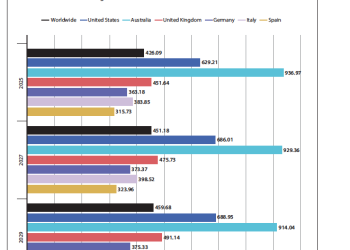
Damith Pallewatte, MD/CEO, HNB.
Sri Lanka’s economy contracted by 7.3 percent in 2022 and 2.3 percent in 2023, but is estimated to achieve 4.5-5 percent GDP growth in 2024 and 2025. Inflation dropped from 69.8 percent in September 2022 to a deflation of 1.7 percent by late 2024 with a return to five percent in early 2025. Successful negotiations for a USD 12.5 billion debt-restructuring plan could save USD 9.5 billion in servicing costs over four years. Post-crisis reforms have lead to key improvements, highlighting the need for bold policy decisions and public-private collaboration. To reimagine its economy amidst global volatility, Sri Lanka should invest in infrastructure, education, and technology, while addressing the struggles of MSMEs through enhanced grassroots capacity and innovation.
The private sector, especially the new generation of Sri Lankans, is essential for transformation. We must address past poor practices and seize opportunities for healthy growth. Attracting foreign direct investment (FDI) and adopting global best practices are crucial for a prosperous future. HNB is aligning its strategies to support these national goals and aid the country’s resurgence, said Damith Pallewatte, MD/CEO, HNB.
Sri Lanka has an opportunity to reshape its economic structure while addressing immediate needs. Easing the burden on citizens and investing in critical areas like infrastructure, education, and technology is essential for national progress. Based on HNB’s work with farmers, traders, and entrepreneurs, successful transformation hinges on diversification, digitalization, and financial inclusion. HNB’s growth strategy aligns with national goals through organic growth, inorganic expansion, and digital transformation for a cashless ecosystem, paving the way for future initiatives across all sectors. Inclusive growth is vital for national progress. Our ‘barefoot banking’ initiatives with Microfinance Officers reach remote Sri Lankans, offering tailored banking solutions and trusted advice to boost income and support rural development. HNB supports grassroots entrepreneurs through Gami Pubuduwa, offering training in financial literacy, business administration, digital payments, and access to export credit and ERP systems. This empowers Sri Lankan entrepreneurs with essential resources. We provide tailored financial products and advisory services to help SMEs become more competitive. Our work drives the digitalization of SMEs, allowing for better customer insights and customized financial solutions. HNB Sarusara aim to modernize agriculture by educating farmers on smart practices and providing affordable technology to boost productivity and profitability.
We aim to expand our presence in farming communities nationwide, targeting 30,000 agripreneurs this year. High-value exports like specialty tea, spices, and fisheries present local value addition opportunities, but a lack of large-scale processors limits smallholder export growth. Our focus on agri modernization addresses these issues by promoting improved inputs, logistics, financial literacy, and direct buyer connections. With post-harvest losses up to 35 percent due to inadequate storage and transport, our data-driven solutions will strengthen the agricultural value chain from planting to sale. We provide tailored financial services for all participants, ensuring that corporates can use advanced systems while small farmers get access to specialized credit and educational programs. This approach reinforces our commitment to a thriving ecosystem for farmers, agribusinesses, and exporters.
Sri Lanka’s USD 80 billion economy must look outward for growth, and HNB is committed to this goal. While supporting local communities and modernizing agriculture, we aim to expand regionally, especially into Bangladesh. Our integrated structure, which includes HNB Finance and HNB Assurance, allows us to meet diverse financial needs and drive innovation through rural microfinance and digital platforms.





